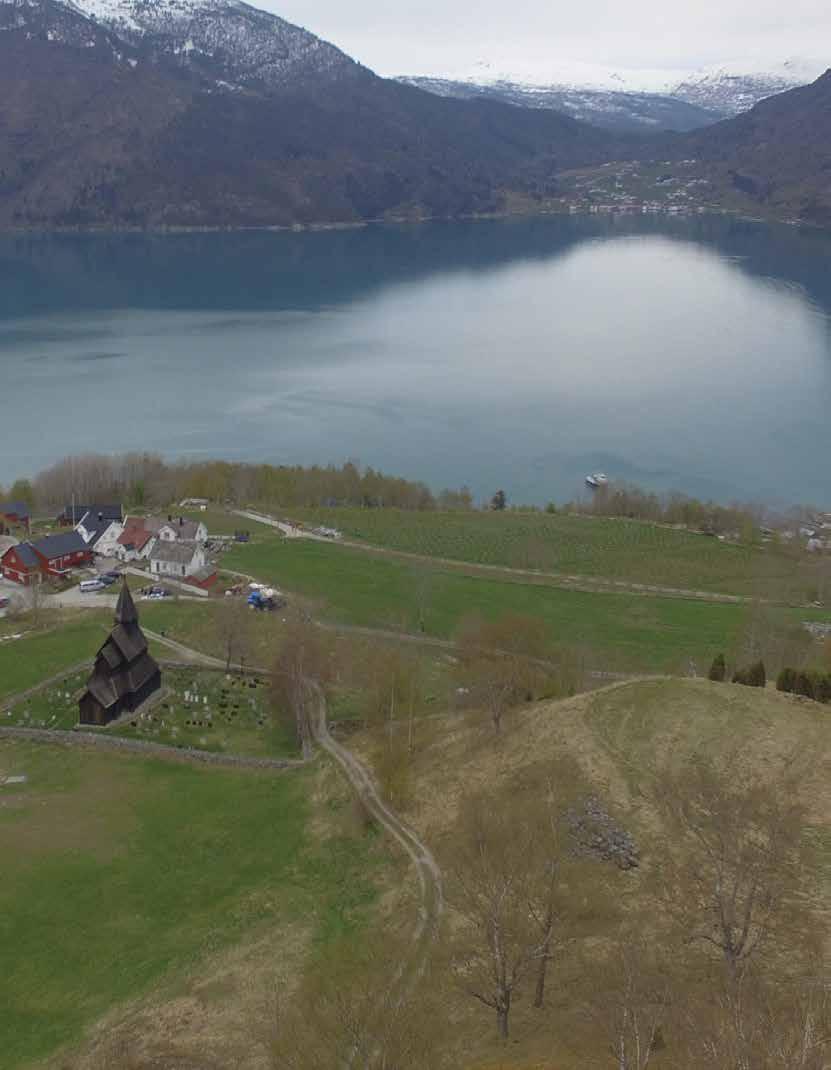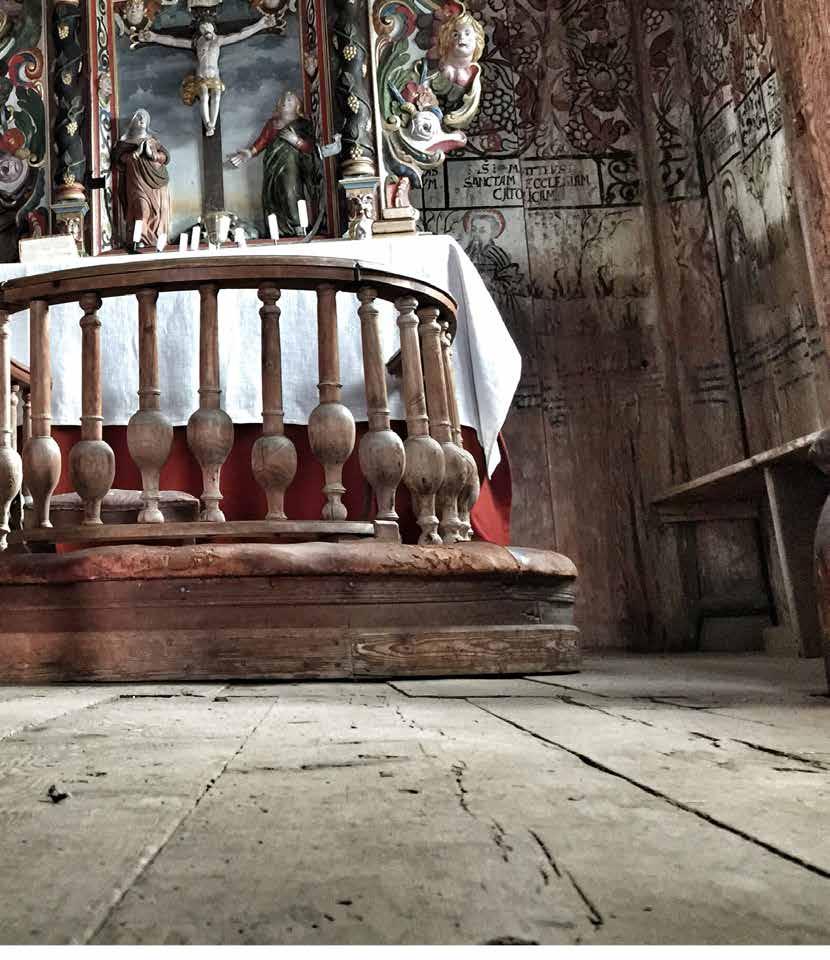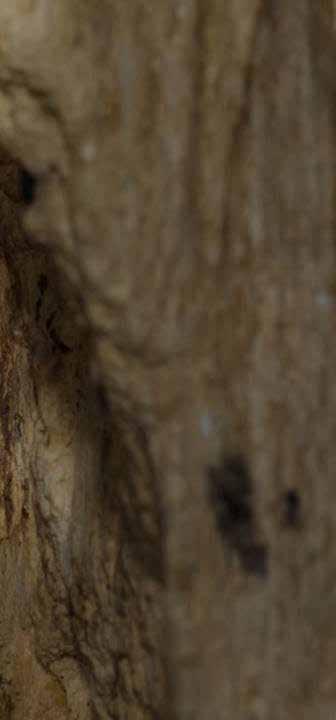The Urnes Lion and the bat with protection superpowers
– A story about taking care of cultural heritage sites and the landscape they are part of.
 Photo: Dronegutta
Photo: Dronegutta

– A story about taking care of cultural heritage sites and the landscape they are part of.
 Photo: Dronegutta
Photo: Dronegutta
In 2017, bat droppings were found in Urnes Stave Church in Luster in the Sogn region. Investigations showed that the droppings were probably from a bat of the species brown long-eared bat.
This discovery caused quite a stir. Experts came to find out what had happened. Newspapers wrote articles about it. Where was the bat, and what had it done?
It turned out that the bat had peed on a post inside the church. Scientists are investigating whether this may have harmed the wood in the valuable church, which is on UNESCO’s World Heritage List.
Based on this case, the National Trust of Norway has created the children’s mascot Fortimus and the story ‘The Urnes Lion and the bat with protection superpowers’. The old Urnes Lion comes to life and gives the bat an important mission. A little ‘Viking bee’ becomes a good helper.
This is a story about taking care of cultural heritage sites and the landscape they are part of.
What can you do when a protected bat damages a protected and irreplaceable cultural monument?
I’m the Urnes lion. Have you heard about my good helper, Fortimus the bat?
Join the dots.
Do you think the lion has colours?
The Urnes Lion is the logo of the National Trust of Norway. It is carved on a post inside Urnes Stave Church.
 Photo: Jiri Havran
Photo: Jiri Havran
Fortimus has just taken a night flight along the Lustrafjord and comes around the headland at Ornes. He flies into the tree tops, where he can find his favourite food – night-flying moths. He catches a big moth and looks around. A dark church tower looms straight ahead of him. A good place to hang and eat the moth, Fortimus thinks and slips in through an opening. It is pitch dark inside. He has flown straight into Urnes Stave Church, the only stave church on UNESCO’s list of the most important cultural heritage sites in the world.

He calls out into the dark room. A loud, high-pitched call, which makes the church completely clear to him. He can ‘see’ everything with his eyes and ears. He flies through some sort of lattice, towards the colours. Towards leaves, flowers, angels and heads with golden hair. The flowers on the wall are the biggest he’s ever seen. Is there a bird there? Fortimus gives a start. No, it’s just a painted leaf on the wall.
Fortimus is very taken with the beautiful little church. He loves old buildings so much! Maybe he should stay here for the summer? I have to see more, he thinks, and flies into the large room. Look at all the strange creatures carved at the top of the posts! What sort of animals are they? He has completely forgotten about the moth he was going to eat.
Photo DroneguttaHe flies around, high and low in the little church. Then he suddenly feels that he needs the toilet. Fortimus has eaten many moths and other insects during the night, and now he is bursting! He hides by one of the posts and hopes that nobody will notice his little accident.

‘What are you doing?’ he suddenly hears a deep voice saying. In the shadows of the church he can see a creature with fangs and a long tongue. The creature moves like a cat, and something resembling wings flaps over its back. What is it? Fortimus shudders.
‘If you pee in here again, you’ll have me to answer to.’ The creature’s voice is strict, and Fortimus can feel himself shaking. ‘Excuse me, but who are you?’ he asks warily. ‘I am the Urnes Lion,’ the creatures says. A lion, Fortimus thinks. ‘Do you think I’m a strange-looking lion?’ a voice growls from the darkness. ‘I’ve never met a lion before,’ Fortimus answers warily. ‘But do you have wings, and can you fly like I can?’ ‘Wings?’ the lion growls. ‘Oh, you mean my long tail with two tassels at the end! No, I just swish it across my back to get rid of annoying flies,’ says the lion. ‘Of course, lions are not common in Sogn,’ it continues, ‘but I came here in 1130 when the church was built. I make sure that it will be taken care of for ever,’ the Urnes lion says. ‘You can fly up and have a look at the carving of me up there on the post.’

You better not do anything to damage old Urnes Stave Church. It’s protected, you know!

‘You better not do anything to damage old Urnes Stave Church. It’s protected, you know! The wood can crumble when you pee on it,’ says the Urnes Lion. Frightened by the creature, Fortimus flies higher up in the church. He doesn’t want to be eaten by a lion – or whatever it is. Besides, the lion should be careful, because bats are protected too. Fortimus belongs to a rare species that needs protection – just like the old church. ‘I’m protected, too,’ he says and sits down on the chandelier. ‘You can’t hurt me.’
‘A protected bat in a protected church – whatever are we going to do with you?’ says the Urnes Lion. ‘You certainly can’t live here, the way you eat and poop.’ The lion growls and thinks, its tail flicking back and forth. Finally, it says: ‘I need help. There’s so much to look after with all the old buildings all over the country. I’m starting to feel a bit tired after all these years. I need a helper who is quick and strong.’
Quick. Fortimus smiles a broad grin that shows his pointy teeth. ‘I am a Plecotus auritus, just so you know. I’m a brown long-eared bat. I belong to the evening bats family. My ears are nearly as large as my body, and I can fly fast in the dark. I can help you to look after things, fly from place to place, but only during the
Photo Droneguttasummer. I sleep all through winter, so you’ll have to find someone else to help you then.’ ‘In that case, I suppose I’ll do the winter shift myself,’ says the Urnes Lion.
‘But are you strong? You need to be as strong as a lion. You have no idea how many threats old buildings face! Will anyone be afraid of a little flying mouse?’ The Urnes Lion’s tail is flicking back and forth. ‘Actually, a lot of people think I’m really scary,’ says Fortimus. He pictures all the times he has scared people by swooping through their gardens in the evening. One time, he and his little sister Fiona flew low over a garden table where a family was sitting eating a late-night snack of hot-dogs. How they screamed!
‘There is a whole family of us,’ Fortimus says. ‘I can ask my family to help. We all really love old buildings. I have an aunt who lives at Steinvikholm castle in Trøndelag. She’s cool. Aunt Fresia looks like a medieval knight. You have to meet her! She has a sword, so she should be a match for a lion.’
A whole family of flying friends to help to protect the old buildings. The lion’s growl is almost cordial when it says: ‘Deal.’

As strong as a lion, Fortimus thinks. Oh dear, he isn’t. Nor is anyone else in his family, although aunt Fresia is as tough as old boots. But his hearing is good – very good. ‘I can hear better than you,’ he says a bit cheekily. ‘I’m faster than you,’ he goes on. There is no answer from the lion. Fortimus looks around. The shadow is gone. There’s no tail in sight.
It’s probably best to get away from the little accident at the post, Fortimus thinks and heads out into the woods. There are still a few hours left of the night. And he has made a deal – with the Urnes Lion himself, no less. He whizzes on, catching insect after insect, flying in tight turns and through the treetops. It’s quiet, the birds are sleeping, he snatches insects from leaves. Then he hears something. A buzzing sound that is familiar, but that shouldn’t be here in the middle of the night. The sound of a flying bee. He calls out.
‘I’ve lost my way,’ says a frightened little voice. ‘I don’t know where my family is.’ Hovering in front of Fortimus is a little bee with some sort of flying helmet on its head. Its wings are beating rapidly. A confused bee, Fortimus thinks.
 Photo Icephotography
Photo Icephotography
‘So who are you, then?’ he asks. ‘I’m an old bee. That is to say, I’m not old, but I come from an old family,’ the voice says. ‘I’m a dark European honeybee.’

‘How old are you?’ asks the bee. ‘Me, who have just been given the job of watching over a church with carvings from the Viking Age,’ says Fortimus. ‘We’re talking nearly a thousand years. That is old! Not to mention my family – my family is ancient! 60 million years.’
‘Actually, my family were with the Vikings,’ the bee says in a slightly stronger voice. ‘Some call us “Viking bees”. But can you help me get home to Gaupne? I’m getting so tired.’ Fortimus is quite impressed by the little creature of Viking descent, and he asks the bee to take a seat on his back. ‘Come on, let’s go.’ ‘But can you find your way in the dark?’ the bee asks. ‘I use my ears well,’ Fortimus answers.
‘Thank you for helping me.’ Fortimus drops the bee off at its hive in Gaupne. ‘You’re nicer than you look,’ it says. ‘Wait a minute, I’ll give you a strengthening treat.’ ‘Have a drop!’ The bee emerges from the hive with something gooey and golden. ‘This is granny’s superhoney,’ says the bee. ‘It makes you strong.’
‘Do you mean that a tiny yellow drop will make me stronger?’ Fortimus looks at the little bee, who nods in reply. Curious, he puts the drop in his mouth. It tastes sweet, sweeter than anything he has ever eaten. Then something happens. The sweet taste disappears, and it feels as if his body is growing. But the strangest thing of all is the enormous strength he can feel in his head. ‘This must be what the Urnes Lion was talking about,’ he shouts eagerly. ‘I’m as strong as a lion.’
And that is how Fortimus came to be known as the bat with protection superpowers. The Urnes Lion’s brave helper who flies around with his family under cover of darkness to make sure that old buildings are taken proper care of. Who cries out when someone wants to tear down a beautiful old building. Who has a secret store of superhoney at his friend’s, the ‘Viking bee’. It only takes one drop – as long as we take good care of bees and bats.
 Photo Dronegutta
Photo Dronegutta
Did you know that the dark european honey bee:
› is called the ‘Viking bee’ because of finds from the Viking Age in Oslo and York
› is an ancient Norwegian bee species

› is a critically endangered species that could become extinct
› makes honey
› thrives in the Norwegian climate
 Thanks to Senior Adviser Bjørn Dahle in the Norwegian Beekeepers Association and to Naturformidling van der Kooij for expert advice on dark European honeybees and bats. We would also like to thank literary scholar Johanne Stende for her assistance and advice.
Text: Astrid Galstad, National Trust of Norway Design: Miksmaster Creative
Photo Anja Laupstad
Vatland
Thanks to Senior Adviser Bjørn Dahle in the Norwegian Beekeepers Association and to Naturformidling van der Kooij for expert advice on dark European honeybees and bats. We would also like to thank literary scholar Johanne Stende for her assistance and advice.
Text: Astrid Galstad, National Trust of Norway Design: Miksmaster Creative
Photo Anja Laupstad
Vatland

› Its body is 4–5 cm long
› Its ears are nearly as long as its body
› Its wingspan is 24–28 cm
› It has large eyes
› It calls through its nose
› Its call starts at a high pitch and ends at a low pitch
› It hunts for insects in the trees
› It likes to eat night-flying moths
Photo Naturformidling van der Kooij› have a high-pitch call
› use their hearing to find their way at close range
› have five fingers and five toes
› use their hind legs as a comb and combs their fur often

› are mammals (give birth to live young)
› usually have one cub a year
› are an ancient group of animals, 60 million years old
› eat insects and spiders (Norway/Europe)
› can eat more than 3,000 insects in a single night
› have 24–38 teeth
› hibernate hanging upside-down during the winter
› can live to the age of 30 or 40
› are protected in Norway and Europe
I’m a brown long-eared bat (Plecotus auritus).
Who do you think the bat’s enemies are in the nature?
Answers: cats, owls, hawks, falcons, martens
Can you think of anything that is going to be taken care of for ever?
That something is protected means:
that we need to preserve it for the future and that it is protected by laws and regulations. Cultural heritage sites, nature and animals can all be protected.
Did you know that
The National Trust of Norway owns Urnes Stave Church. It was built around 1130 and is known for its magnificent wood carvings. Urnes is one of the oldest and best preserved stave churches in Norway.
The Norwegian Red List for Species is an overview of species that are endangered and at risk of disappearing from Norwegian nature. The list contains everything from mammals, birds and fishes to butterflies and bees.
The National Trust of Norway has prepared its own list of old buildings that are endangered and at risk of being torn down.
Urnes Stave Church is particularly valuable. It was included on UNESCO’s World Heritage List in 1979. The buildings and places on this list are irreplaceable to the people on Earth.
UNESCO is the United Nations Educational, Scientific and Cultural Organization.
Do you know any other places that are on UNESCO’s World Heritage List?
There probably used to be about 1,000 stave churches in Norway around 1350 AD. How many Norwegian stave churches survive today?
A) 8 B) 15 C) 58 D) 28
How many stave churches does the National Trust of Norway own?
A) 10 B) 2 C) 28 D) 8
One Norwegian stave church is on UNESCO’s World Heritage List. Which one?
A) Urnes B) Gol C) Borgund D) Heddal
Answers: 28, 8, Urnes
Children and grown-ups from all over Norway have helped to name Fortimus and his family through a competition.
They all love old buildings. Cousin Flagrus enjoys country life, farms and traditional storehouses. Aunt Fabula dreams of all the beautiful churches. Great-uncle Fredo is the kindly monk who looks after medieval monastery ruins. Cousin Fender likes to spend time at lighthouses and forts on the coast.
Follow Fortimus, his little sister Fiona, tough aunt Fresia and the rest of the family on their missions and adventures at the National Trust of Norway’s historic properties! www.fortidsminneforeningen.no
The National Trust of Norway is a voluntary cultural heritage organisation which has endeavoured to preserve Norway’s valuable cultural heritage sites since 1844. Thank you for visiting our properties and thus supporting our work to preserve our cultural heritage for everyone – for ever.
Aunt Fresia Little sister Fiona Aunt Fabula Great-uncle Fredo Cousin Fender Cousin Flagrus - The bat with protection superpowers -